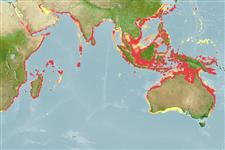Common names from other countries
Elasmobranchii (Haie und Rochen) (sharks and rays) >
Rhinopristiformes (Shovelnose rays) >
Pristidae (Sawfishes)
Etymology: Pristis: Greek, pristis = saw (Ref. 45335).
More on author: Bleeker.
Environment: milieu / climate zone / depth range / distribution range
Ökologie
seewasser; süßwasser; brackwasser demersal; tiefenbereich 5 - 70 m (Ref. 114953). Tropical; 30°N - 37°S, 20°E - 155°E (Ref. 114953)
Indo-West Pacific: Persian Gulf (Ref. 68964), Red Sea and east to South Africa, western India Sri Lanka, Laos to Papua New Guinea, south to New South Wales, western to eastern Australia (Ref. 114953).
Length at first maturity / Size / Gewicht / Alter
Maturity: Lm ?, range 430 - ? cm
Max length : 730 cm TL Männchen/unbestimmt; (Ref. 5578); common length : 550 cm TL Männchen/unbestimmt; (Ref. 11228)
Dark grey to blackish brown above, white to yellowish below (Ref. 11228).
Demersal on both insular and continental shelves, but now thought to be extinct through much if its original range (Ref. 114953). Inshore and intertidal species known to enter freshwater in some areas (Ref. 9859). Found in shallow bays, estuaries, and lagoons (Ref. 11228). Often on the bottom with its saw elevated at an angle to the body axis (Ref. 9859). Feeds on fishes and shellfishes (Ref. 58784). Ovoviviparous (Ref. 50449). Reaches maturity after 9 years. Females have litters of approximately 12 pups. Maturity size unclear, possibly near 430 cm TL; born at approximately 80 cm TL (Ref. 114953). Flesh considered tasty (Ref. 11228).
Life cycle and mating behavior
Geschlechtsreife | Fortpflanzung | Ablaichen | Eier | Fecundity | Larven
Ovoviviparous, embryos feed solely on yolk (Ref. 50449).
Compagno, L.J.V. and P.R. Last, 1999. Pristidae. Sawfishes. p. 1410-1417. In K.E. Carpenter and V. Niem (eds.) FAO identification guide for fishery purposes. The Living Marine Resources of the Western Central Pacific. FAO, Rome. (Ref. 9859)
IUCN Rote Liste Status (Ref. 130435)
Bedrohung für Menschen
Traumatogenic (Ref. 9859)
Nutzung durch Menschen
Fischereien: kommerziell; Sportfisch: ja
Mehr Information
Alter/GrößeWachstumLänge-GewichtLänge-LängeLängenhäufigkeitenMorphometrieMorphologieLarvenLarven Pop.Dyn.RekrutierungDichte
ReferenzenAquakulturAquakultur ProfilZuchtlinienGenetikElectrophoresesVererbbarkeitKrankheitenVerarbeitungMass conversion
Tools
Zusatzinformationen
Download XML
Internet Quellen
Estimates based on models
Preferred temperature (Ref.
115969): 24.6 - 29.3, mean 28.5 (based on 2833 cells).
Phylogenetic diversity index (Ref.
82804): PD
50 = 0.5234 [Uniqueness, from 0.5 = low to 2.0 = high].
Bayesian length-weight: a=0.00501 (0.00198 - 0.01270), b=3.05 (2.83 - 3.27), in cm Total Length, based on LWR estimates for this (Sub)family-body shape (Ref.
93245).
Trophic level (Ref.
69278): 4.0 ±0.6 se; based on size and trophs of closest relatives
Widerstandsfähigkeit (Ref.
120179): niedrig, Verdopplung der Population dauert 4,5 - 14 Jahre. (Fec assumed to be <100).
Fishing Vulnerability (Ref.
59153): Very high vulnerability (90 of 100).
